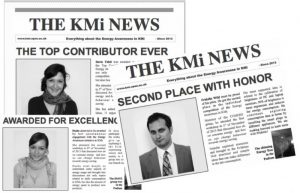News Story
And the winners are
Friday 29 Nov 2013
Ilaria Tiddi, Fridolin Wild and Dasha were announced the top KMi contributors to the internal Energy Awareness initiative which was done under the auspice of DecarboNet project, in collaboration with the Evidence Hub.
The winners were the top contributors of knowledge and ideas about energy consumption and behaviour change, which they debated and shared via the ISAVE Evidence Hub. These contributions were the fuel that illuminated the Energy Tree which brightened our KMi public space for weeks.
Ilaria Tiddi not only won the individual competition amongst her group, but also beat the KMi’s record by creating almost 200 new entries with ideas, arguments, votes, issues and facts. One of her ideas was to “Unplug the power charger when your battery is full and leave it until it’s empty, then charge it again. It should even make your battery live longer”.
Fridolin Wild received the second place award in the individual competition amongst his group. He brought many practical and simple ideas that could make a difference to the lab’s energy consumption. His most supported idea was related to the calibration of brightness of PC and laptop monitors. “50% of brightness is more ergonomic and reduces the energy consumption”.
Dasha deserved to be awarded for her exceptional and spontaneous engagement with the Energy Awareness initiative in KMi. She went far to understand some aspects of energy usage and brought into discussions not only topics related to daily consumption in KMi, but also the amount of energy spent to produce new products.
Congratulations again to the proud winners, and stay tuned for more exciting initiatives and experiments in the new year.
Latest News
PhD Awarded for Groundbreaking Research on Game-Based Cyber Security Training
KMi at the Palace of Westminster: Exploring Blockchain for Society and Economy
OUAnalyse at the Digital Ethics Summit 2025: Advancing Responsible AI in Education

